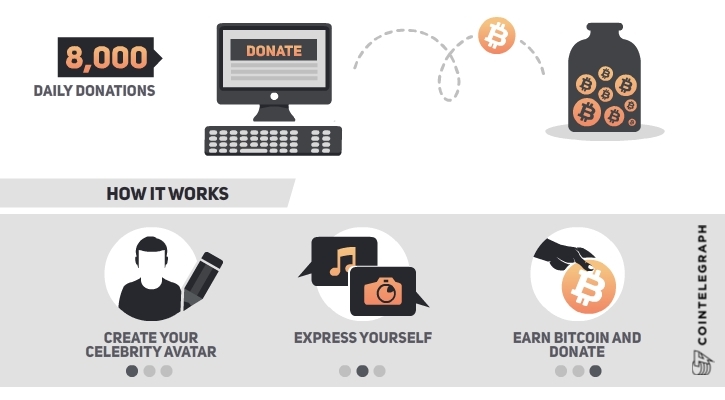At the end of 2013, after reading an article about Bernanke's perspective on Bitcoin and Marc Andreessen’s position on Bitcoin, Francesco Rulli immediately thought of it as being solution to his dilemma of how to distribute money to nearly half a million users scattered across the world that are registered on his platform.
That inspiration led to the formation of BitLanders - a platform enabling users to build engaging content (videos, blogs, photos, advertisements), which a patent pending measurement and reward algorithm, BUZZ SCORE, judges in terms of quality as well as interactions to reward its creator with bitcoin for content performance.
Currently, BitLanders is a community of over 500,000 registered users and has differentiated itself by providing people in unbanked sections of the world the ability to leverage and monetize their talent, all thanks to bitcoin.
“[I]t's with this power of the Blockchain and Bitcoin that we can truly empower women to financial independence, especially in countries where women have limited freedom.”
- BitLanders Founder, Francesco Rulli

Cointelegraph spoke to Francesco to learn how Bitcoin is re-imagining charity and empowering women in third world countries.
Cointelegraph: How did you get introduced to bitcoin? What fascinated you about it?
Francesco Rulli: Cryptocurrencies and Cryptoassetts are very interesting technological and philosophical innovations that can stimulate the curiosity and interest of people. Their complexity can be a challenge that can initiate innovation and spark new motivation in people's lives. I was born with the Italian Lira, I grew up with the Euro, and I matured with the USD, but Bitcoin was the real choice of commercial freedom I was able to take.
This exact same choice can be taken by a 13 year-old girl in Afghanistan independently from the approval of her family or the dangers in her society or the flows in her banking system or government. Women do not necessary need more traditional money as it might result in a liability for kidnapping and theft. They need more connectivity and financial technological independence that can be achieved with Bitcoin and not with traditional fiat currencies.
“[I]t is unthinkable for a young woman in Afghanistan to have a bank account. Bitcoin was and remains the perfect solution […]”
CT: Why did you choose bitcoin as a charity platform? What benefits did it pose over fiat?
FR: In 2011, I saw a video of a young woman who was building Internet classrooms in Afghanistan. I approached her and funded the construction of 11 classrooms and 2 IT Centers. Her name is Roya Mahboob, and even John Kerry praised her work. Together, we connected 55,000 girls to the World Wide Web.
We educated the girls on how to post good quality content and we started rewarding them financially based on their BuzzScore, a proprietary algorithm to measure quality of the content and user's reach and influence.
“Two billion people who can raise or donate 10 dollars each throughout their life time on social media will achieve what Bill Gates did with his donation of 20 billion dollars.”
Sending payments by Paypal wasn't possible as Paypal is not available in Afghanistan and many other parts of the world. We could not wire them money to their bank accounts because the fees were too high and it is unthinkable for a young woman in Afghanistan to have a bank account. Bitcoin was and remains the perfect solution for these redistributions.
In addition, Bitcoin allows us to transfer very small fractions of a cent, down to the five thousandths of a cent! By doing so, we are able to involve people that could not afford traditional donation amounts of US$1 or more, and with their data, we can build a network of supporters and information that can support charities all over the world.
Two billion people who can raise or donate 10 dollars each throughout their life time on social media will achieve what Bill Gates did with his donation of 20 billion dollars. Our focus is to identify donors and supporters who are located in developing countries that are usually not part of major fundraising efforts.

CT: How does bitcoin empower women?
FR: Bitcoin is safe and confidential. The only person who can have access to it is the very person who is supposed to receive the payment. It positions women on the Blockchain ledger and they can exchange values and seek advice and support from very smart people like Marc Andreessen, Fred Wilson and Nic Cary, regardless of their geo location.
I am a strong believer in what Spiderman says: "With power comes responsibility" and it's with this power of the Blockchain and Bitcoin that we can truly empower women to financial independence, especially in countries where women have limited freedom.
CT: What kind of impact has your work with bitcoin had overall?
FR: Having access to Bitcoin and understanding its technology establishes a true opportunity for each individual regardless of their status in society.
In 2013, I mentioned to Roya Mahboob and Fereshteh Forough that Bitcoin was going to be the solution of our problem in distributing money to 55,000 women, and that it was very important that they would support women all over the world to achieve this independence. Today, both Roya and Fereshteh are true pioneers in the Bitcoin industry and already had a major impact on many other women like Parisa Ahmadi (The Age of Cryptocurrency).

